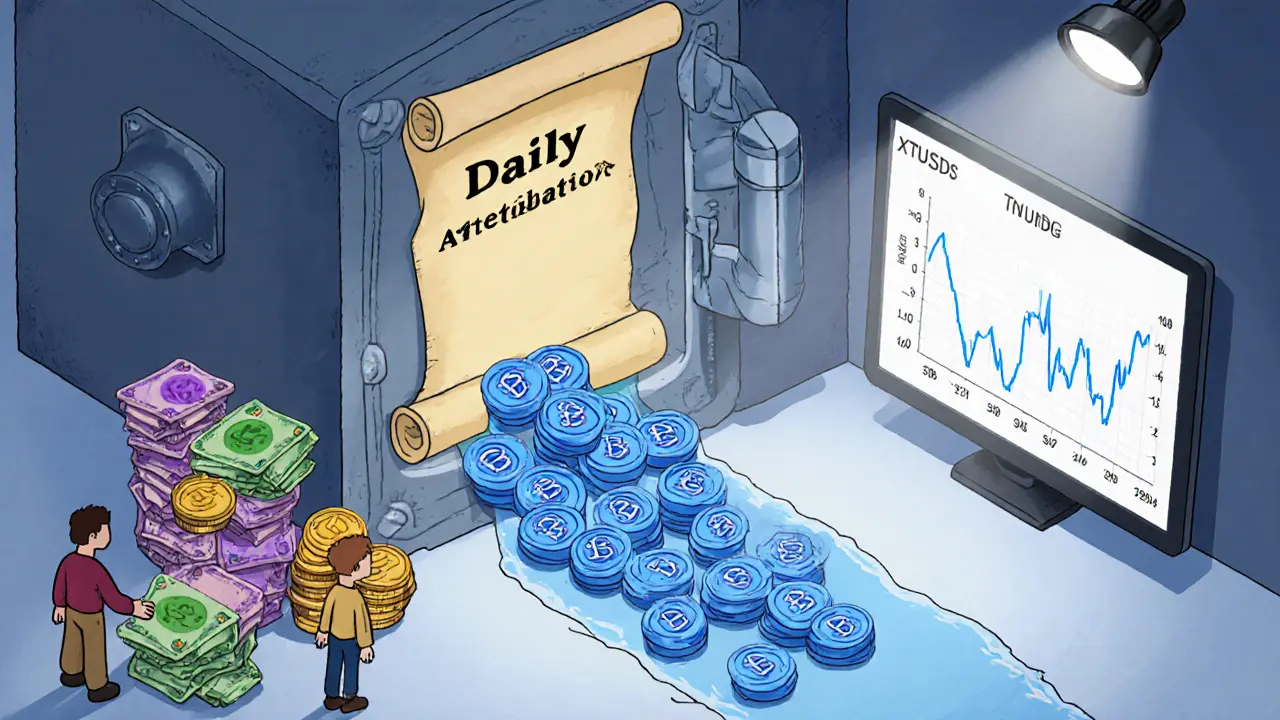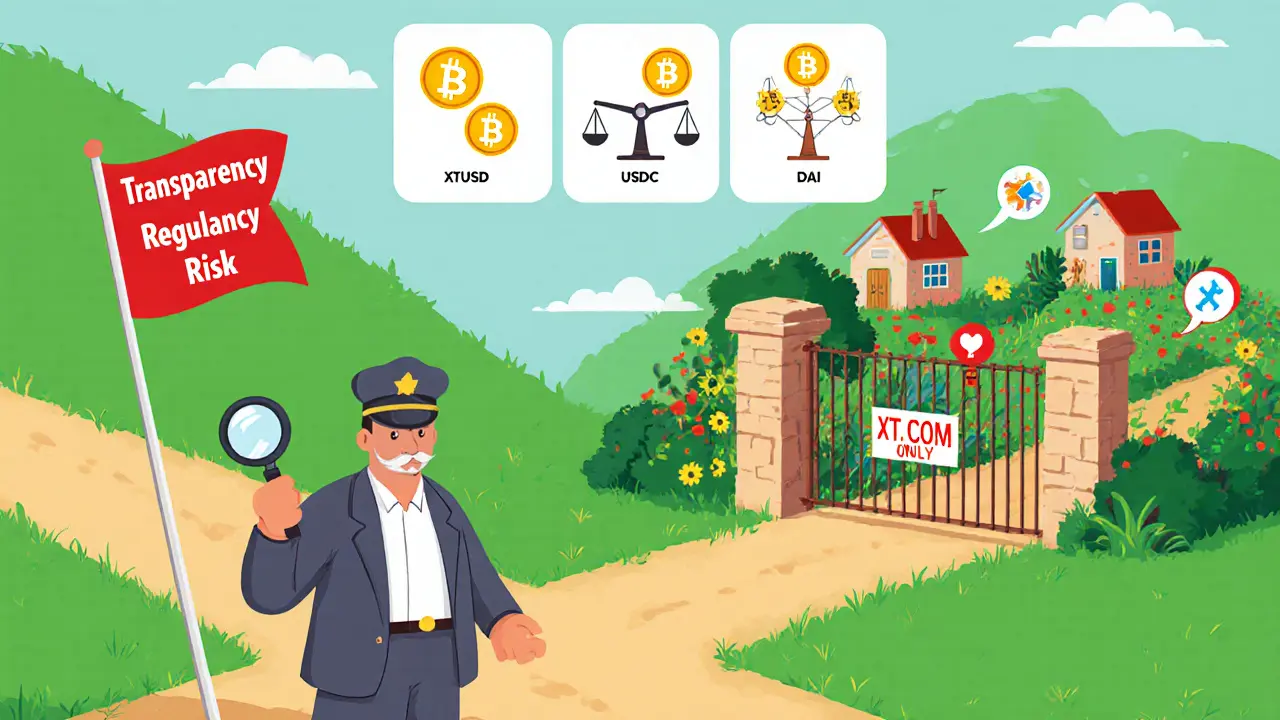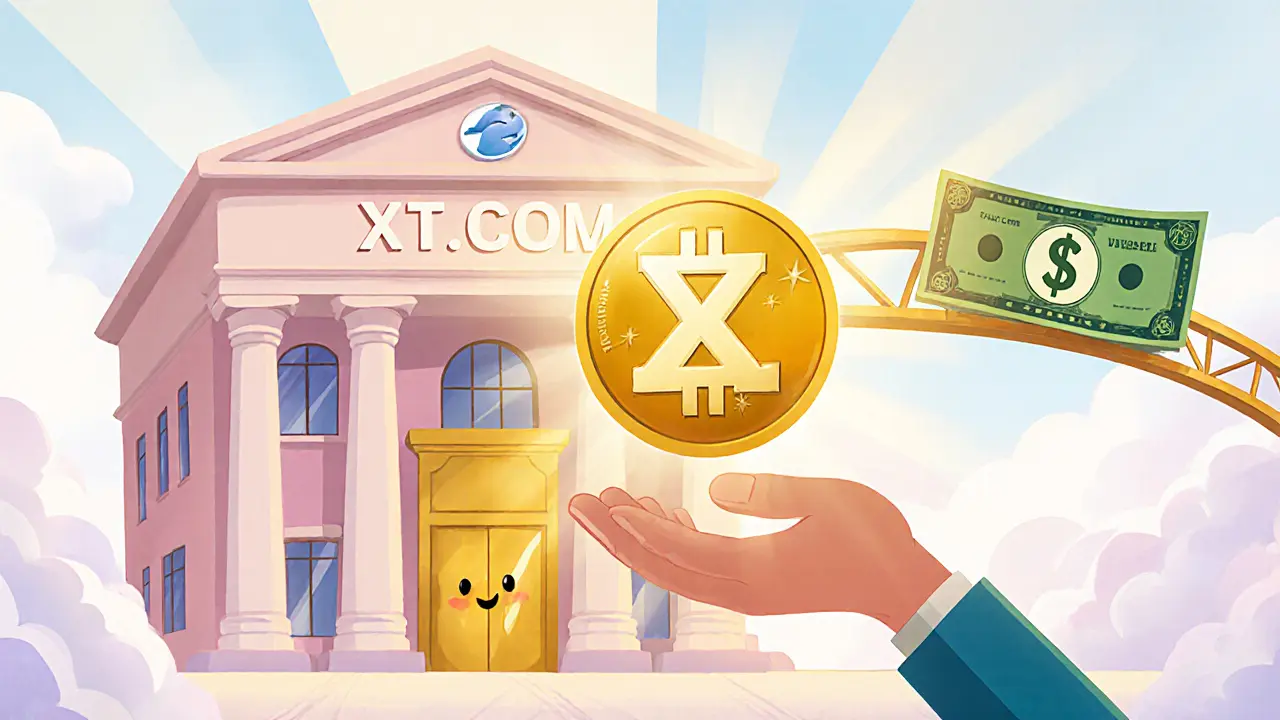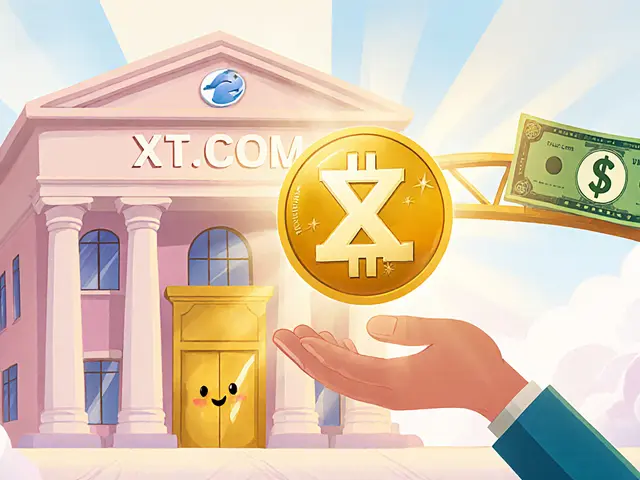XTUSD Peg Stability Calculator
How XTUSD's Peg Works
XTUSD aims for a $1.00 peg, but historically has ranged from $0.974 to $1.06 over the past year. This calculator shows how your value would change at different peg levels.
Result
Note: Historical peg range: $0.974 - $1.06
If XTUSD is trading below $1.00, your value would decrease. If above $1.00, your value would increase.
When you hear the word "stablecoin" you probably think of USDT or USDC. XTUSD is a lesser‑known player that tries to offer a 1‑to‑1 peg to the US dollar, but it lives inside a single exchange ecosystem. If you’re wondering what XTUSD actually is, how it stays close to $1, and why analysts keep raising red flags, you’re in the right place.
What XTUSD Really Is
XTUSD is a stablecoin issued by XT.COM Exchange. Launched on June 23, 2022, the token runs on the ERC20 token standard and lives at the smart‑contract address 0x1a6131eaf7edd96afa10fc75b0d79dd814d19ed0. It has 18 decimals and a total supply of roughly 32.8million tokens, all of which are already in circulation.
How XTUSD Is Minted and Backed
The token uses a so‑called "vault‑minting" mechanism. In practice, users deposit USD‑equivalent assets into a vault managed by XT.COM, and the vault issues an equal amount of XTUSD. Unlike MakerDAO’s DAI, there’s no open‑source collateral pool and no third‑party auditors watching the vault. The reserve information comes from daily self‑reported attestations posted by the exchange, which many analysts label a transparency gap.
Market Snapshot (October122025)
- Current price: $1.001, hovering inside a tight $0.999‑$1.001 band over the last 24hours.
- Market cap: $32.8million (rank #970 by market cap).
- 24‑hour volume: about $8.8million, all on the XT platform.
- Liquidity: roughly $4.3million in daily depth, making large trades risky.
Because XTUSD only trades on XT.COM, its volume spikes when the exchange runs promotions or when market makers push the XTUSD/USDT pair. No other major exchange lists the token, so liquidity dries up quickly if XT decides to delist.

Peg Performance Over Time
XTUSD has stayed close to the dollar, but it’s not perfect. In the past year the price fluctuated between $0.974 and $1.06, meaning the token has de‑pegged by up to 2.6% below and risen 6% above the target. Short‑term snapshots (like a single week in July 2025) show the price barely moving, but the longer‑term range tells a story of occasional stress, especially when reserve doubts surface.
Key Risks to Watch
- Reserve transparency. The $32.8million backing is based on self‑reported attestations, not on an independent audit. Analysts compare this unfavorably to the monthly audits that Tether and Circle now publish.
- Liquidity concentration. All trading happens on one platform. A regulatory hit or technical outage at XT.COM could freeze the entire market for XTUSD.
- Limited DeFi integration. Unlike USDT or USDC, XTUSD isn’t used in lending protocols, yield farms, or cross‑chain bridges. Its utility stays inside a narrow trading pair.
- Staking reward opacity. XT.COM offers staking incentives for holding XTUSD, but the exact APY isn’t disclosed, raising questions about sustainability.
- Regulatory pressure. Global regulators are tightening rules around stablecoin audits. XTUSD’s current model may struggle to meet emerging standards.
How XTUSD Stacks Up Against the Big Three
| Feature | XTUSD | USDT | USDC | DAI |
|---|---|---|---|---|
| Issuer | XT.COM Exchange | Tether Ltd. | Circle/Coinbase | MakerDAO |
| Blockchain | Ethereum (ERC‑20) | Multiple (ERC‑20, TRC‑20, etc.) | Ethereum (ERC‑20) | Ethereum (ERC‑20) |
| Audit Frequency | Self‑reported daily | Monthly attestations | Monthly audits | Weekly collateral reports |
| Liquidity (24h volume) | ~$8.8M (single exchange) | > $200B (multiple exchanges) | ~ $50B | ~ $5B |
| DeFi integration | None | Wide (lending, swaps, etc.) | Wide | Core DeFi primitive |
| Transparency rating | Red flag (no third‑party audit) | Mixed (recent scrutiny) | High (regular audits) | High (transparent collateral) |
The table makes it clear: XTUSD’s niche is its exchange‑specific use case, not broad market adoption. If you need a stablecoin for high‑volume trading, bridging, or DeFi yields, the big three still dominate.

How to Get and Use XTUSD
If you already have an account on XT.COM, buying XTUSD is as easy as swapping fiat for the XTUSD/USDT pair. The exchange also lets you stake XTUSD, but the exact reward percentage is hidden behind a login screen. Outside of XT, you can’t deposit XTUSD into most wallets that support ERC‑20 tokens, because the exchange doesn’t provide a withdrawal path to external addresses - a design choice that keeps the token locked inside its own ecosystem.
Future Outlook
Looking ahead, XTUSD’s fate hinges on three things: a) whether XT.COM decides to open the token to other exchanges, b) if the team publishes a credible third‑party audit, and c) if developers start building any DeFi products that accept XTUSD. So far, there’s no public roadmap, and the token’s market share remains under 0.001% of total crypto. In a post‑2022 environment where regulators demand proof of reserves, XTUSD’s current model feels outdated.
Bottom Line
XTUSD offers a dollar‑pegged token for traders who live on the XT platform, but its limited liquidity, opaque reserves, and lack of DeFi use cases make it a high‑risk holding compared to mainstream stablecoins. If you’re comfortable with exchange‑specific assets and don’t need wide‑area adoption, XTUSD can serve as a convenient trading pair. Otherwise, you might be better off with USDC or DAI, which provide audited backing and a richer ecosystem.
Frequently Asked Questions
What blockchain does XTUSD run on?
XTUSD is an ERC‑20 token on the Ethereum network, using the contract address 0x1a6131eaf7edd96afa10fc75b0d79dd814d19ed0.
Is XTUSD backed by real dollars?
The exchange says each XTUSD is backed 1‑to‑1 by USD‑equivalent assets, but the backing is shown only through daily self‑attestations, not an independent audit.
Can I withdraw XTUSD to an external wallet?
Currently XT.COM does not allow withdrawals to external addresses, so XTUSD stays locked inside the exchange.
How does XTUSD’s price stability compare to USDT?
Both aim for a $1 peg, but USDT trades on dozens of platforms with deep liquidity. XTUSD’s price has stayed within a $0.974‑$1.06 band over the past year, while USDT typically stays within 0.5% of $1.
Is staking XTUSD profitable?
XT.COM advertises staking rewards but does not publish the exact APY, so the profitability is unclear until you log in and view your personal rate.





Jade Hibbert
October 12, 2025 AT 08:30Oh great, another exchange‑only stablecoin.
Scott Hall
October 17, 2025 AT 05:10XTUSD’s one‑exchange model can be convenient if you’re already trading on XT, but it also means you’re locked into a single point of failure. The lack of external withdrawals is a real pain point for anyone who wants flexibility. That said, the token’s peg has held relatively steady so far.
Hanna Regehr
October 22, 2025 AT 04:37For anyone eye‑seeing the XTUSD landscape, it’s important to note the self‑reported reserve system. While the daily attestations give a surface‑level view, the absence of third‑party audits leaves a transparency gap that regulators are sniffing at. Treat it as a high‑risk component in a diversified portfolio.
Laura Myers
October 27, 2025 AT 00:17Whoa, so you’re basically saying the token is a shiny box with no safety net? Yeah, it’s like walking a tightrope over a canyon with a single rope-thrilling until it snaps.
Lena Vega
October 31, 2025 AT 23:44Liquidity dries up fast if XT.com hiccups.
Brandon Salemi
November 5, 2025 AT 17:37Staking rewards are hidden, which is a red flag.
Leynda Jeane Erwin
November 10, 2025 AT 14:17While the exchange promotes convenience, the undisclosed APY undermines trust; transparency should be a priority, even in casual communication.
Siddharth Murugesan
November 15, 2025 AT 08:10XTUSD is a joke; an exchange‑only token with no audit is just a glorified IOU.
Daron Stenvold
November 20, 2025 AT 07:37Indeed, the lack of independent verification raises substantial concerns regarding the token’s solvency and regulatory compliance.
Annie McCullough
November 25, 2025 AT 01:30From a market microstructure perspective, the token’s narrow trading venue limits order flow depth, which could exacerbate slippage during volatility storms.
Carol Fisher
November 29, 2025 AT 22:10Only a nation that values financial sovereignty would tolerate such opaque assets, but we should protect our economic integrity! 🚀
Melanie Birt
December 4, 2025 AT 16:04If you need a stablecoin for cross‑chain DeFi, consider USDC or DAI; they offer audited backing and robust ecosystem integration.
Lady Celeste
December 9, 2025 AT 15:30Sounds like a typical exchange lock‑in.
Jon Asher
December 14, 2025 AT 09:24I’ve seen similar tokens on other platforms and they usually disappear after a few months.
Ben Parker
December 19, 2025 AT 06:04🚨 Watch out for the exit risk; once XT.com pulls the plug, you’re stuck!
Anjali Govind
December 23, 2025 AT 23:57What would happen if regulators demanded proof of reserves for XTUSD?
Sanjay Lago
December 28, 2025 AT 23:24If they force an audit, the exchange might have to shut down the token, which could be a big looooss for users.
Ethan Chambers
January 2, 2026 AT 17:17One could argue that the very existence of such a token underscores the market’s fascination with novelty over substance.
Nina Hall
January 7, 2026 AT 13:57But hey, for a niche trader, that novelty can be a glittering opportunity!
Manas Patil
January 12, 2026 AT 07:50In the Indian crypto community, we often see a preference for assets with clear legal standing; XTUSD may struggle to gain traction here.
Brandon Salemi
January 17, 2026 AT 07:17The fundamental issue with XTUSD lies in its single‑exchange dependency, which creates a central point of failure that smart investors cannot ignore.
When an asset’s liquidity is confined to one platform, any technical downtime or regulatory action against that platform immediately jeopardizes the token’s market.
Moreover, the self‑reported daily attestations, while giving the illusion of transparency, lack the rigor of third‑party audits that reputable stablecoins provide.
Audits serve as a verifiable bridge between the issuer’s claims and investors’ trust, and without them, the backing of XTUSD remains essentially unproven.
The token’s peg performance, ranging from $0.974 to $1.06 over the past year, demonstrates that it can deviate significantly under stress.
Such deviations, even if modest, can trigger cascading liquidations in leveraged positions on the exchange.
Additionally, the inability to withdraw XTUSD to external wallets locks users into the XT ecosystem, preventing them from accessing broader DeFi opportunities.
This lock‑in also means that users cannot hedge or diversify their holdings using external protocols.
From a regulatory standpoint, global authorities are increasingly demanding proof of reserves and independent verification for stablecoins.
If XT.COM fails to meet these emerging standards, it may face restrictions that could further erode confidence in XTUSD.
Investors seeking stability should therefore consider alternatives like USDC, which publishes monthly audits, or DAI, which offers decentralized collateralization.
While XTUSD might serve a niche purpose for traders already on the platform, its risk profile is considerably higher than that of mainstream stablecoins.
In practice, this translates to a higher cost of holding, both in terms of potential loss from peg instability and opportunity cost from limited utility.
Hence, treating XTUSD as a core reserve asset in a portfolio is ill‑advised without thorough due diligence.
Ultimately, the token’s future hinges on XT.COM’s willingness to open its reserves to scrutiny and to broaden its market presence beyond a single exchange.